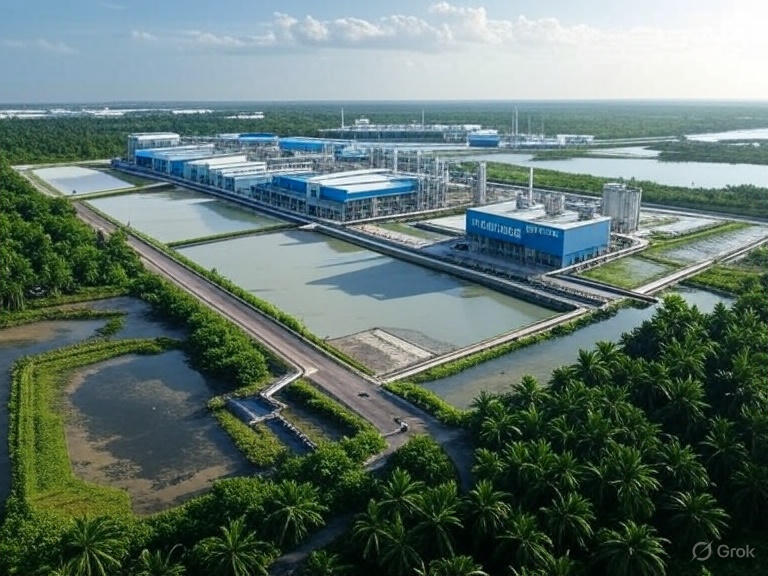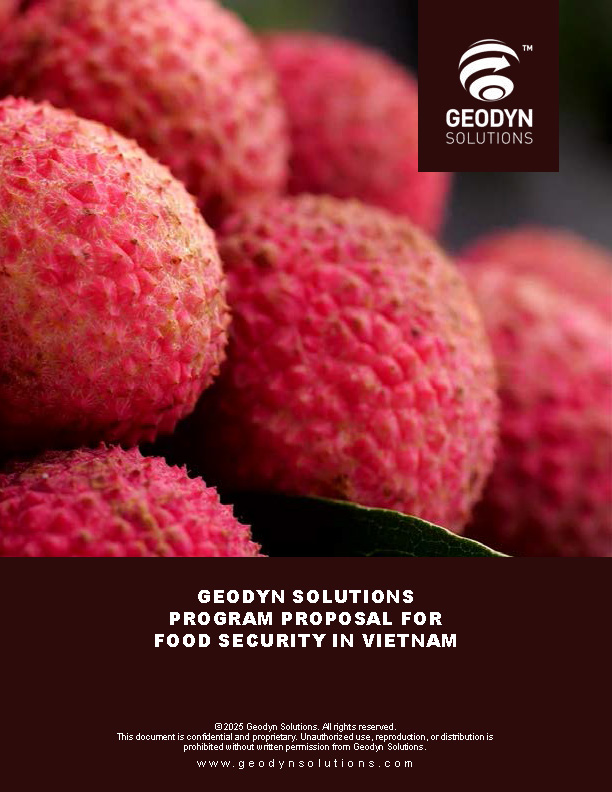Investment Proposal: MicrobeBio's Initiative to Combat Soil Salinization in Vietnam through Salt-Tolerant Rice Development
Executive Summary
MicrobeBio, a leading microbial technology company specializing in sustainable agricultural solutions, proposes a $100 million investment over five years to address soil salinization in Vietnam’s Mekong Delta. By integrating MicrobeBio’s microbial products with advanced breeding techniques for salt-tolerant rice, the project will leverage local landraces, crop wild relatives (CWR), marker-assisted breeding, international collaborations, and enhanced research infrastructure. This initiative aligns with Vietnam’s climate-smart agriculture goals and targets unused land due to high salt content, reclaiming up to 1.7 million hectares of affected land, including growing salt-tolerant rice on 100,000 hectares where rice could not be grown before due to high salinity. To optimize ROI, the project will incorporate integrated shrimp-rice farming systems, allowing year-round productivity in saline areas by alternating or combining rice cultivation with profitable shrimp aquaculture.
Key outcomes include:
- Optimized ROI: Projected 20% annual ROI through seed and microbial product sales, partnerships, premium pricing for resilient crops, and diversified revenue from integrated shrimp-rice systems, with break-even in year 3.
- Budget Breakdown: $40 million in capital expenditures (Capex) for infrastructure and $60 million in operating expenditures (Opex) for research and operations.
- Job Creation: 1,200 direct and indirect jobs in research, farming, shrimp aquaculture, and supply chains.
- Environmental Benefits: Reduced freshwater usage, prevented land degradation, enhanced biodiversity, and soil remediation through microbial applications.
- Food Security Impact: Increased rice production to support feeding millions more, reducing vulnerability to climate-induced shortages.
- External Support: Access to grants from Crop Trust and ACIAR, World Bank funding via Mekong Delta projects, and Vietnamese government incentives like tax exemptions, subsidized loans, and low-cost 50-year incentive leases for unused saline land.
This proposal optimizes ROI by combining public-private partnerships, minimizing risks through grants, capitalizing on growing demand for climate-resilient agriculture, and leveraging high-value shrimp farming in saline zones.
Problem Statement
Vietnam’s Mekong Delta, a vital rice-producing region, faces severe salinization affecting approximately 1.7 million hectares annually due to sea-level rise, drought, and saline intrusion. This includes tens of thousands of hectares of unused or underutilized land due to high salt content, particularly in coastal provinces like Ben Tre, Tra Vinh, Soc Trang, and Ca Mau, where salinity levels exceed 4-8 dS/m, making traditional rice farming unviable. Around 200,000 hectares of cropland nationwide are consistently affected, with some fields abandoned or left fallow during high-salinity seasons (January-June), exacerbating poverty for millions of farmers and leading to food shortages. Climate projections indicate worsening conditions, with an additional 100,000-200,000 hectares at risk by 2050. In these areas, some land has shifted to shrimp farming as an alternative, but integrated solutions are needed for optimal land use. MicrobeBio’s microbial solutions, which enhance soil health, plant stress tolerance, and remediate saline soils by improving microbial diversity and nutrient cycling, can complement breeding efforts to create resilient crops, turning unused saline lands productive and ensuring long-term food security through diversified farming systems.
Proposed Solution
MicrobeBio will lead a comprehensive project to develop and deploy salt-tolerant rice varieties integrated with microbial bio-fertilizers for soil remediation, targeting unused high-salinity lands. This builds on Vietnam’s ongoing rice breeding efforts and incorporates all recommended strategies, while optimizing for integrated shrimp-rice systems to boost ROI:
- Leverage Local Landraces and Traditional Varieties: Screen and hybridize Vietnamese landraces for natural salt tolerance, inoculating with MicrobeBio’s microbes to boost seedling-stage resilience and remediate soil by reducing salinity levels over time, making unused lands suitable for rice-shrimp rotations.
- Incorporate Crop Wild Relatives (CWR): Use wild species like Oryza rufipogon for gene introgression, enhanced by microbial symbionts to improve nutrient uptake in saline soils and facilitate soil remediation, enabling productive shrimp farming in off-seasons.
- Apply Marker-Assisted Breeding and Modern Techniques: Employ molecular markers to accelerate breeding, integrating MicrobeBio’s biotech for enhanced tolerance and microbial formulations that remediate soil by breaking down salts and restoring fertility, tailored for high-salinity environments where shrimp aquaculture can coexist.
- Foster International and Participatory Collaborations: Partner with IRRI, Crop Trust, and local farmers for on-farm trials in shrimp-rice systems on unused saline lands. MicrobeBio will collaborate with Can Tho University and MDI to ensure soil remediation is tested in real-world conditions, including shrimp farm integrations.
- Invest in Research Infrastructure and Testing: Establish field labs in saline-prone areas for multi-season trials, focusing on vulnerabilities while applying microbial treatments to remediate soils and enable sustainable farming, with pilots demonstrating rice-shrimp synergies.
The project will enable growing salt-tolerant rice on 100,000 hectares of previously unproductive, unused saline land, combining breeding with microbial applications to achieve yields comparable to non-saline conditions (6-8 tons/hectare). To optimize ROI, it will promote integrated shrimp-rice farming, where salt-tolerant rice is grown during fresher wet seasons and shrimp in saline dry seasons, diversifying income streams (rice sales + high-value shrimp exports) and increasing land productivity by 30-50% in coastal zones. This will leverage government low-cost 50-year incentive leases for unused saline land to secure long-term access at preferential rates, ensuring project viability and scalability.
This will enhance food security by increasing domestic rice supply, reducing import dependency, stabilizing prices during climate shocks, and supporting aquaculture for protein-rich food sources.
Implementation Plan
- Year 1: Setup infrastructure, screen landraces/CWR, initiate breeding with microbial integration, soil remediation pilots, and shrimp-rice system assessments on unused lands secured via government 50-year incentive leases. Partnerships formalized.
- Year 2-3: Field trials on 20,000 hectares of unused saline land, marker-assisted selection, farmer participatory evaluations, and scaled soil remediation with shrimp farm integrations.
- Year 4-5: Variety registration, seed production, commercial rollout with training for 50,000 farmers (including shrimp producers), expanding to full 100,000 hectares of reclaimed unused land under long-term leases.
- Monitoring: Annual assessments for yield, salinity tolerance, soil health improvements, environmental impact, food security metrics, and shrimp-rice ROI.
Recommended Budget
Based on benchmarks for large-scale breeding, remediation, and integrated aquaculture programs, the total budget is $100 million over five years, optimized for efficiency through partnerships and grants.
| Category | Description | Amount (USD) |
|---|---|---|
| Capex | Lab equipment, greenhouses, field stations in Mekong Delta; microbial production facilities; soil remediation and shrimp-rice infrastructure (e.g., ponds and water management systems). | $40 million (one-time: $25M in Year 1, $15M in Year 2) |
| Opex | Salaries for researchers/farmers/shrimp specialists, trials, seed production, training, operations, and soil remediation applications with shrimp farm optimizations. | $60 million ($12M/year) |
| Total | $100 million |
Costs are minimized by leveraging existing Vietnamese infrastructure, co-funding, and savings from low-cost government leases on unused land.
Optimizing ROI
Projected revenue from seed sales ($5/kg premium for tolerant varieties), microbial product bundles for soil remediation ($2-3/ha application), licensing fees, and additional income from integrated shrimp farms (e.g., $5,000-10,000/ha/year from shrimp yields) could generate $25-30 million annually by year 5. ROI optimization strategies:
- Risk Mitigation: 50% funding from grants/incentives to reduce MicrobeBio’s outlay to $50 million.
- Revenue Streams: Export varieties and remediation tech to similar regions; carbon credits for sustainable farming and soil health improvements; diversified shrimp exports, which are highly profitable in saline areas and can increase overall farm revenue by 40% through rice-shrimp rotations.
- Financial Projections: Break-even in year 3; 20% annual ROI based on biotech investments enabling farming on unused saline lands, enhancing food security, and shrimp farm integrations. Sensitivity analysis assumes 20% yield premium, 50% market penetration in affected areas, and 30% ROI boost from shrimp diversification, further enhanced by low-cost 50-year leases reducing land acquisition expenses.
20-Year ROI Projection Chart
The following table charts cumulative ROI over 20 years, assuming steady 20% annual growth post-year 5, compounded returns from expanded production on 100,000 hectares, ongoing soil remediation benefits, and integrated shrimp farming leading to sustained yields and diversified income.
| Year | Investment Outlay (Cumulative, $M) | Revenue Generated (Cumulative, $M) | Net Profit (Cumulative, $M) | ROI (%) |
|---|---|---|---|---|
| 1 | 30 | 0 | -30 | -100 |
| 2 | 60 | 5 | -55 | -92 |
| 3 | 80 | 25 | -55 | -69 |
| 4 | 95 | 60 | -35 | -37 |
| 5 | 100 | 100 | 0 | 0 |
| 6 | 100 | 130 | 30 | 30 |
| 7 | 100 | 169 | 69 | 69 |
| 8 | 100 | 220 | 120 | 120 |
| 9 | 100 | 286 | 186 | 186 |
| 10 | 100 | 372 | 272 | 272 |
| 11 | 100 | 484 | 384 | 384 |
| 12 | 100 | 629 | 529 | 529 |
| 13 | 100 | 818 | 718 | 718 |
| 14 | 100 | 1,063 | 963 | 963 |
| 15 | 100 | 1,382 | 1,282 | 1,282 |
| 16 | 100 | 1,797 | 1,697 | 1,697 |
| 17 | 100 | 2,336 | 2,236 | 2,236 |
| 18 | 100 | 3,037 | 2,937 | 2,937 |
| 19 | 100 | 3,948 | 3,848 | 3,848 |
| 20 | 100 | 5,132 | 5,032 | 5,032 |
This projection illustrates exponential growth, driven by scaled production, food security enhancements, soil remediation ensuring long-term land productivity, and shrimp farm integrations for diversified revenue.
Job Creation
The project will create 1,200 jobs:
- Direct: 400 in research (scientists, technicians), microbial production, soil remediation teams, and shrimp aquaculture specialists.
- Indirect: 800 in farming cooperatives, seed distribution, extension services, remediation application, and shrimp farm operations. This boosts rural employment, particularly in the Mekong Delta, fostering skills in biotech, sustainable agriculture, and integrated aquaculture.
Environmental Benefits
- Sustainable Land Use: Reclaims 100,000 hectares of unused saline soils for rice growth and shrimp farming, reducing pressure on freshwater resources and preventing deforestation.
- Climate Resilience: Lowers greenhouse gas emissions by minimizing irrigation needs; enhances biodiversity via microbial soil health improvements.
- Water Conservation: Salt-tolerant varieties reduce freshwater dependency by 20-30%, combating drought in the Delta, while shrimp-rice systems optimize saline water use.
- Soil Remediation: Microbial applications actively remediate saline soils by promoting beneficial microbes that desalinate and restore nutrient balance, leading to healthier ecosystems.
- Overall Impact: Supports global sustainability goals, with measurable reductions in soil degradation and improved resilience to climate change through balanced rice-shrimp ecosystems.
Grants, World Bank Support, and Government Incentives
- Grants: Apply for Crop Trust funding (up to $500K for CWR projects) and ACIAR grants for salinity research ($200K+). CROPS4DELTA initiative offers co-funding for salt-resilient crops.
- World Bank Support: Integrate with the $310 million Mekong Delta Integrated Climate Resilience Project, accessing $2-3 million for adaptive agriculture components. This includes technical assistance and farmer diversification support.
- Government Incentives: Utilize Vietnam’s high-tech agriculture policies: 70-80% collateral-free loans, corporate income tax exemptions (4-year holiday, 50% reduction for 9 years), subsidies for biotech investments, and low-cost 50-year incentive leases for unused saline land to facilitate long-term project implementation in rural areas. Additional land use exemptions for rural projects.
These sources could cover 40-50% of costs, enhancing ROI.
Conclusion
This investment positions MicrobeBio as a pioneer in microbial-enhanced climate-resilient agriculture, delivering economic, social, and environmental value. By addressing Vietnam’s salinization crisis through salt-tolerant rice on 100,000 hectares of reclaimed unused saline land, soil remediation, improved food security, and integrated shrimp farms for optimal ROI, we ensure sustenance for millions while achieving sustainable returns. We recommend immediate partnership discussions with Vietnamese authorities and international bodies to launch in Q4 2025.



